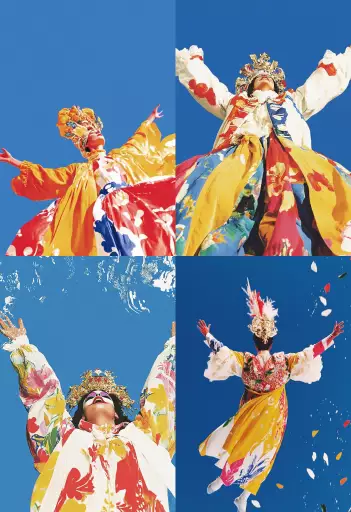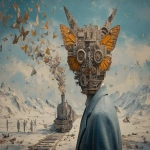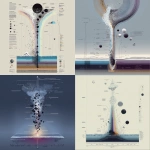Explore the Best AI Image Gallery

AI-Generated Media: A Creative Revolution or Ethical Quandary?
The realm of creativity is undergoing a profound transformation, propelled by the emergence of artificial intelligence (AI). AI-generated media, encompassing everything from text and images to music and video, is rapidly blurring the lines between human and machine creation. This new frontier presents both exhilarating opportunities and complex ethical dilemmas that demand careful consideration.
A Creative Catalyst: Unleashing New Possibilities
AI algorithms are empowering creators with unprecedented tools to augment their artistic endeavors. Imagine:
- Artists using AI to generate unique visual concepts, explore novel styles, or refine existing artwork.
- Writers collaborating with AI to overcome writers block, brainstorm plot ideas, or develop compelling characters.
- Musicians leveraging AI to compose original melodies, experiment with different genres, or create immersive soundscapes.
These are just a few examples of how AI is democratizing creative processes, making them more accessible and empowering individuals to express themselves in innovative ways.
Navigating the Ethical Labyrinth
While the potential benefits of AI-generated media are undeniable, several ethical considerations demand our attention:
- **Authorship and Ownership:** When an AI creates a work of art, who owns the copyright? Is it the programmer who developed the algorithm, the user who provided the input, or the AI itself?
- **Bias and Representation:** AI algorithms are trained on vast datasets, which can inadvertently perpetuate existing societal biases. This can result in AI-generated media that reinforces harmful stereotypes or excludes certain perspectives.
- **Misinformation and Manipulation:** The ability to generate realistic synthetic media raises concerns about the spread of misinformation and the potential for malicious actors to create convincing deepfakes for propaganda or deception.
- **Impact on Human Creativity:** Will AI-generated media diminish the value of human creativity or lead to a decline in original artistic expression?
These are complex questions that require ongoing dialogue and thoughtful solutions. Establishing clear guidelines, promoting responsible development practices, and fostering public awareness are crucial steps towards navigating these ethical challenges.
Shaping the Future: Responsible Innovation and Collaboration
The future of AI-generated media hinges on our ability to harness its transformative potential while mitigating its risks. This requires a multi-faceted approach:
- **Investing in Ethical Research and Development:** Prioritizing research that explores the ethical implications of AI, develops bias mitigation techniques, and promotes transparency in algorithmic decision-making.
- **Fostering Interdisciplinary Collaboration:** Bringing together experts from diverse fields, including computer science, ethics, law, art, and social sciences, to ensure a holistic understanding of the challenges and opportunities presented by AI-generated media.
- **Encouraging Public Engagement and Dialogue:** Promoting open discussions about the societal impact of AI, involving diverse perspectives, and empowering individuals to participate in shaping the future of this technology.
By embracing responsible innovation, fostering ethical development practices, and prioritizing human values, we can ensure that AI-generated media becomes a powerful tool for creativity, expression, and societal progress.
](https://images.ai-img.art/thumbnails/150/58fa7e3c741db40e9e61e20410c8d5675b11efb625df109812cc768f9b17b717.webp)
](https://images.ai-img.art/thumbnails/150/266c825c7f03beff90a8a60e36207b8240cdf722eb1cf5db26e8adb51b992287.webp)









](https://images.ai-img.art/thumbnails/150/6650b0d98c6fec81df8bdfb569e0033970b46a653d188dde42417e624901493f.webp)






](https://images.ai-img.art/thumbnails/150/b814eba984b490e7f87095501b4c13b17e89f8960f044f09fbf2053969d9be29.webp)

](https://images.ai-img.art/thumbnails/150/230fb1adf4241373591167585daecc4556f4c58c4d0dc33638c62b1c60c1b72a.webp)


](https://images.ai-img.art/thumbnails/150/f7e46d83151e744219d4886ca1329794d3e9d5071649abea0b2996cb34c3c77c.webp)





](https://images.ai-img.art/thumbnails/150/bda14621f89269b376d6681934fea3c4af8c5f8593b80e1cb25cdf0047f98621.webp)




](https://images.ai-img.art/thumbnails/150/2f4f685af05f9526e1ac2f05f53dbb1d97bf8a65f6a41c6e67059c5ed2aa871f.webp)






](https://images.ai-img.art/thumbnails/150/396b1c442fa4d576e35f871ba0f3c7e52bb62c6bcee69082dbcb816a5fd3aa8c.webp)


](https://images.ai-img.art/thumbnails/150/10ab1dbb1358d3dbba41472a395400bd9daf5cba3f5c8841970b4110820d5a15.webp)




